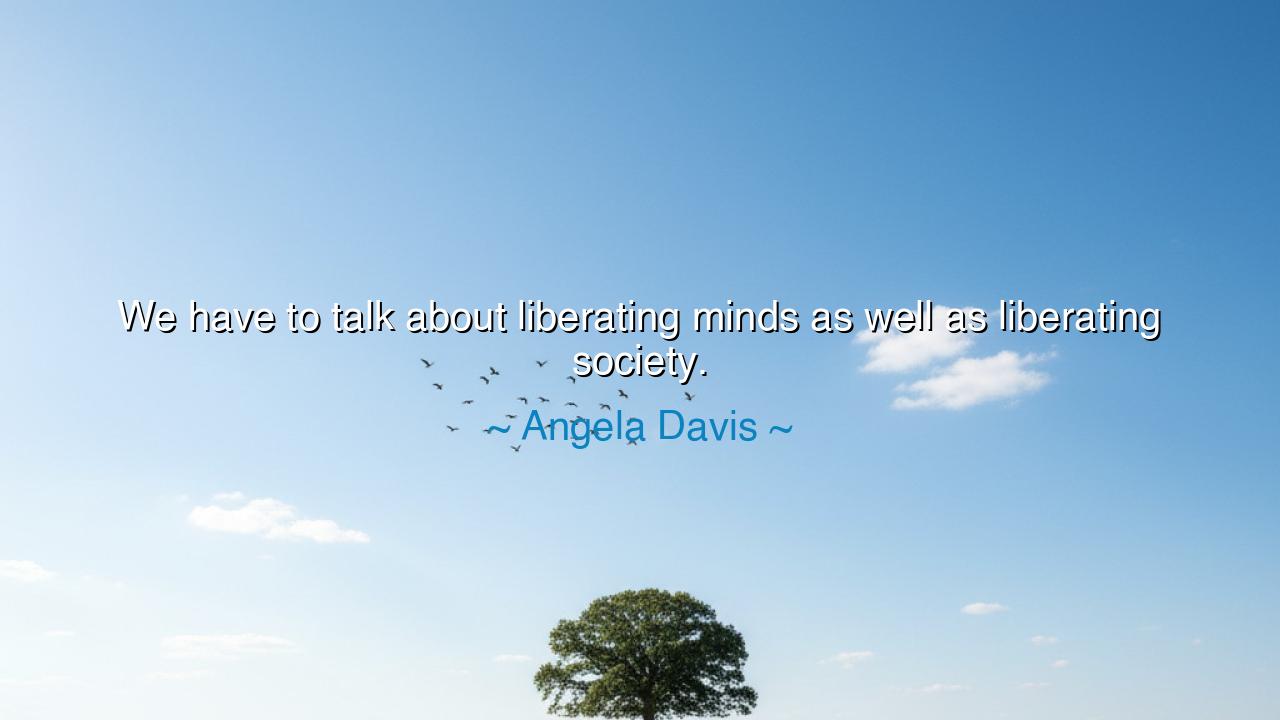
We have to talk about liberating minds as well as liberating






O children of the future, listen with open hearts to the words of Angela Davis, a woman whose life has been dedicated to the liberation of both the mind and the society it inhabits. She said: "We have to talk about liberating minds as well as liberating society." These words speak to the depth of the struggle for freedom—a struggle not only for external liberation, but for the freedom of thought, the very essence of the soul and spirit. Davis calls upon us to recognize that true liberation is a twofold effort: it requires both the revolution of the society around us and the transformation of the minds that shape it.
In the time of the ancients, the philosophers understood the importance of the mind in shaping the society. Socrates believed that the pursuit of wisdom was the highest calling of the individual, for the mind, when free, could bring about the good life. He argued that one must first liberate oneself from the shackles of ignorance and false belief before any lasting change could be made in the world. Plato shared this vision in his Republic, where he described the journey of the philosopher-king, one who had liberated their mind through reason and wisdom to govern a just society. These ancient teachings underscore the idea that true freedom begins within—only when the mind is freed from the limitations of fear, dogma, and oppression can it lead to the creation of a just society.
Consider the story of Spartacus, the gladiator turned leader of a slave rebellion in ancient Rome. Spartacus was not only fighting for the physical freedom of his people but for their mental liberation as well. The chains of slavery were not only physical but psychological—the belief that they were powerless, that they could never be free, was perhaps the strongest chain of all. It was through knowledge, through the realization that they could fight back, that Spartacus and his followers began to liberate their minds. They rose against the brutal system that sought to keep them in submission, not just in body, but in spirit. Spartacus’ rebellion was a struggle for both external freedom and internal enlightenment, for the shackles of the mind are often more binding than those of the body.
In the 19th century, Frederick Douglass, the great American abolitionist and former slave, spoke of a similar struggle for the liberation of the mind. In his powerful speeches and writings, he often emphasized the importance of education in the fight for freedom. He understood that for a society to be truly liberated, its people must first be liberated in mind. To enslave the mind, Douglass wrote, was to keep the spirit of the people in bondage, even if their bodies were free. Through education, through the power of knowledge and self-awareness, a person could begin to break the chains of oppression that society had placed upon them. Douglass knew that the physical freedom of African Americans could never be fully realized until the mental shackles of inferiority and subjugation were destroyed.
Angela Davis, in her own life and work, has carried this torch. She fought not only for the physical freedom of oppressed people but for the liberation of their minds. Davis spent much of her life battling the institutionalized oppression that shackled the African American community, particularly in the face of the prison-industrial complex and the systemic racism that still grips many parts of the world. She understood that, much like Douglass and Socrates, true liberation cannot occur unless society and individuals are free to think for themselves, to question, and to act with awareness and purpose. The mind must be liberated from the systems that seek to control thought, just as society must be freed from the structures that perpetuate inequality and injustice.
Davis’ call is not just for revolution in the streets, but for a revolution in how we think—about ourselves, about each other, and about the world in which we live. She urges us to liberate ourselves from the mental chains that society has placed upon us: the prejudices, the ignorance, the fear. Liberating minds is not just about changing what people do, but about changing how they think—how they see themselves, how they see others, and how they see their role in shaping the world. The mental liberation that Davis speaks of is the power to imagine a different world, to rethink the way society works, and to act with a sense of deep awareness and justice.
And so, O children, as you move through this world, take Davis' words to heart. Know that true liberation begins with the mind—with the ability to think freely, to question, to learn, and to grow. To liberate society, we must first liberate ourselves—our hearts, our minds, and our spirits. Let your thoughts be unshackled from the chains of prejudice and fear, and let them be guided by wisdom, compassion, and justice. Stand firm in the knowledge that it is not enough to change the world around you; you must also change the way you see the world. Only then can you help create a society that is truly free, not just in the body, but in the mind.






AAdministratorAdministrator
Welcome, honored guests. Please leave a comment, we will respond soon